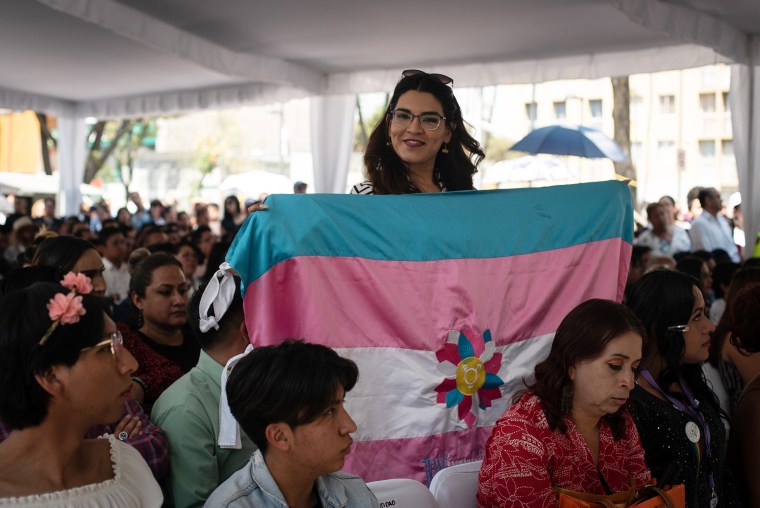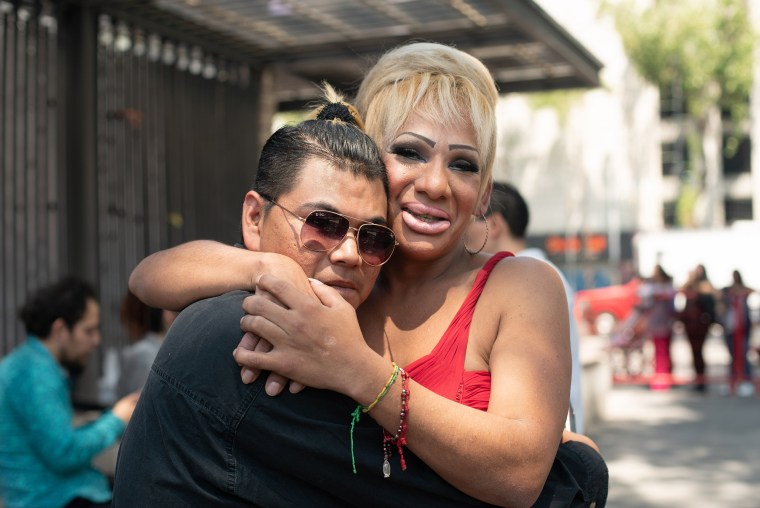Ana Scarlett Vargas was assigned male at birth, but she said she knew she was a girl at just 7 years old. At 13, she started performing in drag shows, impersonating the Mexican actress Laura Leon, in the tourist city of Acapulco where she was raised.
During one performance, she was shocked to find her father in the audience. "I prefer you dead, than as a fag," she recalled him saying, before beating her. Vargas left home shortly after and became a sex worker at 15 to support herself and send money home for her 14 siblings.
"We deserve this celebration for all the happiness that we have lacked in all these decades."
Kenya Cuevas
Now, more than two decades later, Vargas is still impersonating Leon. Most recently, however, she did so on stage at her own wedding, which was held Saturday at a central plaza in Mexico City. Vargas and her now-husband joined 140 other LGBTQ couples to tie the knot in a collective wedding organized by Rainbow Caravan, a Mexico City government campaign aimed at eliminating discrimination against lesbian, gay, bisexual, transgender and queer people.
On the same day, Vargas — along with 30 others — legally changed the gender marker on her government-issued ID to represent her gender identity, not her sex assigned at birth.
This time, Vargas' father texted her a congratulatory message and a blessing on her wedding day for her and her new husband, Hector Aaron Roman. Vargas said she and Roman met on Facebook and instantly fell in love. Roman, with tears in his eyes, said when Vargas heard about the collective wedding, she proposed to him and he accepted.
"I am now 36 years old, and my dreams have finally come true," Vargas told NBC News, referring both to her marriage and to her new legal identity as a woman. "This is really going to help us, because we suffer constant discrimination that prevents us from getting honest work.”
As is the case for transgender people in many parts of the world, Vargas said she had few options to earn money aside from participating in sex work to survive. But in Mexico, where the murder rate is on the rise and 95 percent of homicides reportedly go unprosecuted, sex work can be an especially dangerous endeavor. The government does not track transgender murders, but the organization Letra Ese estimates that 40 transgender people were killed in Mexico in 2019. When trans women are slain, it is known as a “transfemicide,” where the victims are specifically targeted for being trans women.
Within the past five years, two of Vargas’ friends, Paola Buenrostro and Alessa Flores, were killed while doing sex work in Mexico City. Vargas and other sex workers took to the streets, shutting down major roads and demanding justice for their friends and that the government take measures to prevent trans killings.
Vargas said following her marriage this past weekend, she has decided she will no longer participate in sex work.
"I will keep doing drag shows, because I enjoy them so much, but sex work is too much of a risk,” she said. “People denigrate you and ... one day you can end up hung from a tree.”
Kenya Cuevas, who was been on the forefront of the movement to protect trans women from violence, recently opened up a community center, Casa de Muñecas Tiresias, aimed at supporting transgender sex workers and other vulnerable populations. At the community center, Cuevas has also helped many people file their paperwork for their gender identity change and marriage.
"These are the gains we have worked toward for years,” Cuevas said. “We deserve this celebration for all the happiness that we have lacked in all these decades.”
Since gay marriage was legalized in Mexico City in 2010, approximately 13,000 same-sex couples have married there, and since the city made it legal for transgender people to officially change their gender in 2015, about 5,000 people have done so, according to government data. Currently, one-third of Mexican states now permit a change of gender identity and two-thirds permit gay marriage.
The northern Mexican state of Zacatecas permits neither, and in support of transgender people's rights in this region, Fernanda Delgada formed the organization Transformando Vidas (Transforming Lives). Three years ago, she traveled to Mexico City to change her identity and is now the first trans woman in Zacatecas to have a passport with her gender identity, not her sex assigned at birth.
"My life changed,” she said. “I feel like a complete woman, a free woman with the confidence to go to any hospital or institution with my ID that represents me.”

Delgada helped 11 people from Zacatecas travel to Mexico City to participate in the "Rainbow Caravan" and legally change their gender identity. Among them was Jaime Samuel de Loera Marquez who is still in high school and was accompanied by his mom to the ceremony.
"This is a right that we should have since birth; it is our right to our identity," Marquez said. While he said his teachers have been supportive and always ask him which pronoun and name he prefers, he said it has been a constant hassle to have an ID that does not reflect his gender expression and name. Marquez will enter college next semester and is excited that we will no longer have this issue.
Delgada's organization is campaigning for Zacatecas state to legalize gender identity change so trans people won’t have to travel hundreds of miles to do so.
"I hope this right will soon be a right that everyone can access,” added Marquez.
At the end of the ceremony all the participants toasted in celebration. Vargas and Roman took their vows, and Vargas, who is HIV-positive, thanked Roman for accepting and loving her.
"I've been given a second chance at life with someone who loves me for all my defects and virtues,” she said.


